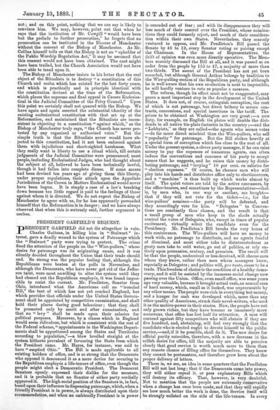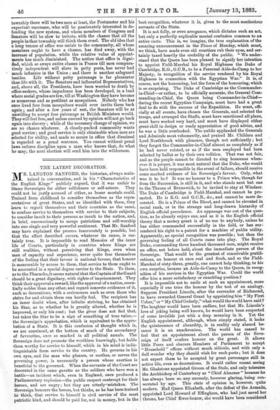PRESIDENT GARFIELD'S BEQUEST.
PRESIDENT GARFIELD did not die altogether in vain. Charles Guiteau, in killing him in " Stalwart " in- terest, gave a deadly wound to the system of Patronage which the " Stalwart " party were trying to protect. The crime fixed the attention of the people on the " Wire-pullers," whose desire for patronage was its originating cause, and it was silently decided throughout the Union that their trade should end. So strong was the popular feeling that, although the Republicans were beaten at the polls in November, and although the Democrats, who have never got rid of the Jeffer- son taint, were most unwilling to alter the system until they had cleared out the Republican employes, it was found impos- sible to resist the current. Mr. Pendleton, Senator from Ohio, introduced what the Americans call an " ironclad Bill," the text of which has not yet reached England, but which provides that officials under the United States Govern- ment shall be appointed by competitive examination, and shall hold their places during good behaviour ; that they. shall be promoted only by merit and after examination, and that no " levy " shall be made upon their salaries for political purposes. Moreover, by a clause which in England would seem ridiculous, but which is consistent with the rest of the Federal scheme," appointments in the Washington Depart- ments shall be apportioned among the States and *Territories according to population,"—a blow levelled straight at the system hitherto prevalent of favouring the State from which the President came. Mr. Hayes, for instance, was said to have " emptied Ohio." The Bill is made applicable to all existing holders of office, and is so strong that the Democrats who opposed it denounced it as a mere device for securing to the Republican employes a life-tenure of office, even though the people 'might elect a Democratic President. • The Democrat Senators openly. expressed their dislike for the measure, and it is probable that no Senator of either party cordially approved it. The high social position of the Senators is, in fact, based upon their influence in dispensing patronage, which, when a friendly President is in power, is always distributed upon their recommendation, and when an unfriendly President is in power is conceded out of fear; and with its disappearance they will lose much of their control over the President, whose nomina- tions they could formerly reject, and much of their considera- tion within their own States. Nevertheless, they scarcely ventured to oppose, and Mr. Pendleton's Bill passed the Senate by 46 to 19, every Senator voting or pairing except the Chairman. In the House of Representatives, the drift of opinion was even more directly operative. The Mem- bers scarcely discussed the Bill at all, and it was passed as an order from the people by 155 to 47, a majority of more than two-thirds. The assent of the President has not yet been • recorded, but although General Arthur belongs by tradition to the Wire-palling section of the Republican party, and although he is well aware that his own re-election is next to impossible, he will hardly venture to veto so popular a measure. The reform, though its effect must not be exaggerated, may prove a most important step in the development of the United States. It does not, of course, extinguish corruption, the root of which is not patronage, but direct bribery to secure con- tracts, concessions, and special insertions in the tariff. The prizes to be obtained at Washington are very great ;—a new duty, for example, on English tin plates will double the divi- dends in all native tin-plate factories in the country ;—and the " Lobbyists," as they are called—the agents who secure votes —do far more direct mischief than the Wire-pullers, who sell " popularity " for patronage. But the Bill strikes heavily at a special form of corruption which lies close to the root of all.
Under the present system, a clever party manager, if he can faise- money to pay the expenses of numerous agents, can often.
induce the conventions and caucuses of his party to accept names that he suggests, and he raises this money by distri- buting patronage, and " levying " 10 per cent. on salaries for " election expenses." Of course, he chooses men who will play into his hands and distributes office only to electioneerers, and a " machine " is thus built up which works almost by itself. The quiet voters are told by the active canvassers, by the office-bearers, and sometimes by the Representatives—that is; by men who, in one way or another, are bought— that if they will not vote for the ticket—i.e., for the- wire-pullers' nominee—the party will be defeated, and they accordingly vote for him. " Delegates " to Conven- tions are constantly thus chosen, and the result is that a small group of men who keep in the shade actually control the votes of Delegates, who, except in times of popular excitement, virtually select the candidate even • for the Presidency. Mr. Pendleton's Bill breaks the very bones of this contrivance. The Wire-pullers will have no money to work with, no patronage to distribute, and no agents fearful of dismissal, and must either take to disinterestedness as gouty men take to cold water, go out of politics, or rely en- tirely upon persuasion, oratory, and promises. The result will be that the people, undeceived or less deceived, will choose men whom they know, rather than men whom managers know, especially as Delegates ; and politics will, pro tanto, cease to be a trade. This freedom of choice is the condition of a healthy demo- cracy, and it will be assisted by the immense social change now passing over the Union. Office, even small office, was some years ago very valuable, because it brought actual cash, an annual sum of hard money, which, small as it looked, was unprocurable by any other means. The people were rich in everything but money, and a hunger for cash was developed which, more than any other quality of Americans, struck their novel-writers who used it as the motive-power in their stories. Now, the people have not- • only grown richer, but they have become so immensely more numerous, that office has lost half its attraction. A man will contend against fifty competitors who will abstain if they are five hundred, and, abstaining, will feel very strongly that the candidate who is elected ought to devote himself to the public service,—and, if it be possible, shall do it. The new desire for official purity coincides, therefore, with a new decrease in the selfish desire for office, till the majority are able to perceive. clearly that good service is worth much more to them than any remote chance of filling office for themselves. They know they cannot be postmasters, and therefore grow keen about the proper delivery of letters.
There is, we see, an idea in some quarters that the Pendleton Bill will not last long ; that-if the Democrats come into power, they will either repeal it, or pass explanatory Bills which will destroy its efficacy. That, however, is very doubtful. Not to mention. that the people are extremely ceneervative when a change has once been made, and that they will rapidly see how much better the work is done, the Service itself will be strongly enlisted on the side of the life-tenure. In every township there will be two men at least, the Postmaster and his expectant successor, who will be passionately interested in de- fending the new system, and whom members of Congress and Senators will be slow to irritate, with the chance that all the people in that township will think them cruel. The old idea that a long tenure of office was unfair to the community, all whose members ought to have a chance, has died away, with the increase of population, while the relative value of appoint- ments has much diminished. The notion that office is digni- fied, which so sways entire classes in France till men compara- tively independent will slave in petty posts, has never had much influence in the Union ; and there is another safeguard besides. Life without petty patronage is far pleasanter than life with it. The Senators and influential Representatives, and, above all, the Presidents, have been worried to death by office-seekers, whose impudence has been developed, in a land where social grades are few, till at Washington they have become as numerous and as pestilent as mosquitoes. Nobody who has once lived free from mosquitoes would ever invite them back again ; and after a few years of rest, the Senators will be as unwilling to accept free patronage as British Ministers would. They will feel free, and unless coerced by opinion will not go back again into slavery ; while of the necessary change of opinion, we see no chance whatever. A closely-packed community wants good service ; and good service is only obtainable when men are selected for ability, and made so secure in office that dismissal is regarded as a penal sentence. You cannot without penal laws enforce discipline upon a man who knows that, do what he may, the next election will send him into the wilderness.



































 Previous page
Previous page